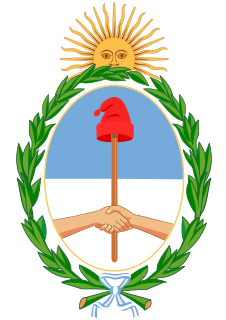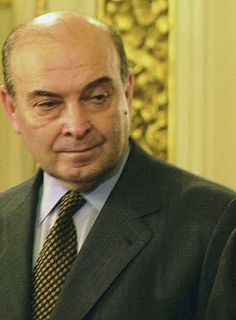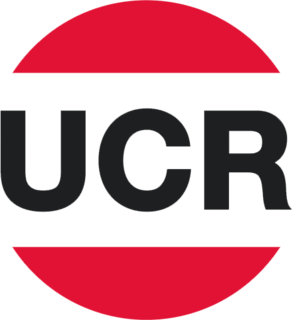
The politics of Argentina take place in the framework of what the Constitution defines as a federal presidential representative democratic Republic, where the President of Argentina is both Head of State and Head of Government. Legislative power is vested in the two chambers of the Argentine National Congress. The Judiciary is independent of the Executive and the Legislature. Elections take place regularly on a multi-party system.
The Front for a Country in Solidarity was a political coalition in Argentina. It was formed in 1994 out of the Broad Front, which had been founded mainly by progressive members of the Peronist Justicialist Party who denounced the policies and the alleged corruption of the Carlos Menem administration; the Frente joined with other dissenting Peronists, the Unidad Socialista and several other leftist parties and individuals. Its leading figures were José Octavio Bordón, Carlos "Chacho" Álvarez and Graciela Fernández Meijide.

Argentina held presidential and parliamentary elections on Sunday, April 27, 2003. Turnout was 78.2%. No one presidential candidate gained enough votes to win outright, but the scheduled runoff was canceled when first-round winner Carlos Menem pulled out, handing the presidency to runner-up Néstor Kirchner.

Argentina held national parliamentary elections on Sunday, 23 October 2005. For the purpose of these elections, each of the 23 provinces and the Autonomous City of Buenos Aires are considered electoral districts.

Carlos Alberto "Chacho" Álvarez is an Argentine politician; he was Vice President of Argentina during part of President Fernando de la Rúa's term, and currently heads the ALADI Secretariat.
The Olivos Pact refers to a series of documents signed on November 17, 1993, between the governing President of Argentina, Carlos Menem, and former President and leader of the opposition UCR, Raúl Alfonsín, that formed the basis of the constitutional reform of 1994. These memorandum of understanding were signed in the official presidential residence, the Quinta de Olivos.

Rosa Graciela Castagnola de Fernández Meijide known as Graciela Fernández Meijide is an Argentine teacher, human rights activist and politician. She came to prominence by investigating the forced disappearances of thousands of people during the Dirty War. She later served as a deputy, senator, and government minister for the FrePaSo party.

José Octavio Bordón is an Argentine politician and diplomat.

Álvaro Carlos Alsogaray was an Argentine politician and businessman. Minister of Economy during much of the 1959-62 period, he was one of the principal proponents of economic conservatism in modern Argentina.

The Argentine general election of 1995 was held on 14 May. Voters chose both the President and their legislators and with a turnout of 82.1%.

Argentina held presidential and parliamentary elections on 24 October 1999.

The Argentine general election of 1989 was held on 14 May 1989. Voters chose both the President and their legislators and with a turnout of 85.3%, Carlos Menem won the presidency, and the Justicialist Party won the control of both houses of Congress. This is the last presidential election the president was elected by the electoral college.
The Argentine legislative elections of 1991 were held between August and December, though most polls took place on 8 September. Voters chose their legislators and governors and, with a turnout of 79.9%, it produced the following results:

The Argentine legislative elections of 1993 were held on 3 October. Voters chose their legislators and, with a turnout of 80.3%, it produced the following results:

The Integration and Development Movement is a political party in Argentina.

Horacio Massaccesi is an Argentine politician and former Governor of Río Negro Province.
Carlos Menem was president of Argentina from 1989 to 1999.





















